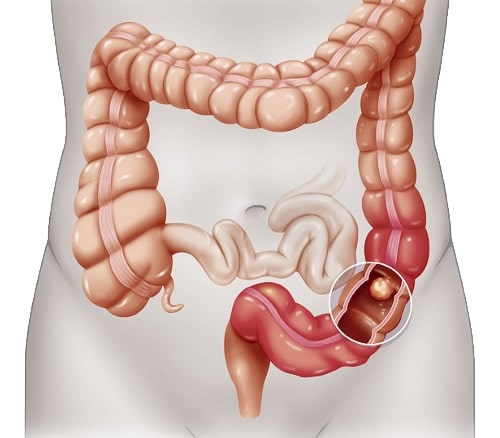Cancers from the large intestine and rectum, the last part of the large intestine. In our country, large intestine cancers are in second order in women and third in men.
Risk Factors
Age; Even if cancer of the large intestine and rectum occurs at any age, the risk increases after 50 years of age. Even if large bowel cancer occurs at any age, more than 90% of patients are over 50 years of age. After this age, the risk doubles every 10 years.
Family; 20% of patients have familial transmission, but the remaining 80% do not have a family history. In the family (first and second degree relatives) and / or in itself; The risk for the following diseases are increased.

- Large bowel cancer history
- A history of large intestinal polyps
- Patients with ulcerative colitis and Crohn's disease (increased risk for patients with disease for more than 8-10 years)
- Breast, ovarian and uterine cancer
- Diet and Environmental Factors; Animal fats, low-fiber food, alcohol, smoking, obesity and sedentary life increase the risk.

Symptoms
- Bleeding from the rectum
- Changes in defecation habits
- Abdominal pain
- Weight loss
- Anemia-Fading
- Bloating
Treatment Of Colon And Rectal Cancer
The definitive treatment is surgery. In surgery, the diseased portion is removed and the intestine is reassembled (anastomosed), so that the patient does not need ostomy (aperture-bag created for surgical defecation). However, if the cancer is located in the rectum, the approach will be different.
The rectum is approximately 15-18 cm of the large intestine after the rectum and is examined in 3 sections, the part after the breech’s bottom and in order middle and upper rectum parts.
In cancers of the upper rectal region, the diseased portion is removed and the intestines are joined. In cancers of the middle rectal segment, the intestines are joined, but the small intestine is temporarily removed for subsequent closure to retain sutures in the joined intestinal portion.
In lower rectal cancers, permanent ostomy may be required.
Surgical treatment of colon and rectal cancer is now performed safely as laparoscopic (closed).
Pursuance
Recurrent cancers are most commonly detected within two years. Therefore, follow-up should be performed frequently during this period. But at least 5 years of follow-up is required. Follow-up after 5 years is primarily for detecting new polyps and may be performed less frequently.



